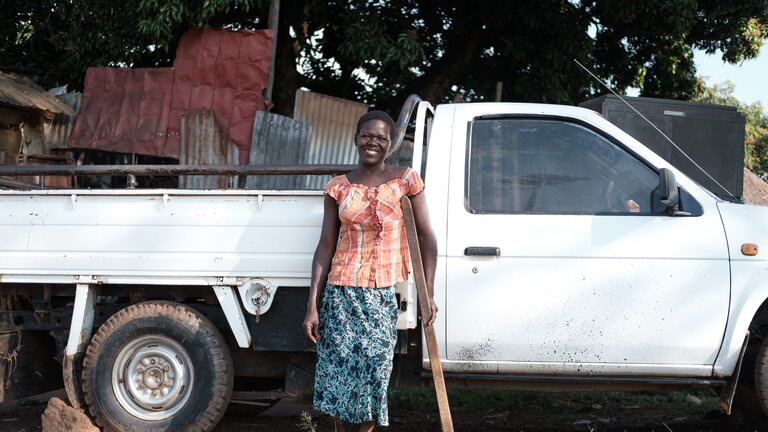Finding A-maize-ing Opportunities in The Market
Grace is a 34-year-old who lives in Gulu City with her two children. She has a physical impairment, but she can still walk and move from one place to the other. Grace’s source of income was the snacks (chapati and mandazi) which she used to sell in schools. However, when the COVID-19 pandemic hit in March 2020, schools were closed, and Grace’s business shut down, leaving her with nothing else to do since she had no extra skills to rely on to earn a living.

At the Gulu Disabled Persons Union office, Grace met Okello Denish, a Disability Inclusion Facilitator working with Light for the World. At that time, she had no source of income, and feeding her household was a challenge.
"When we talked, I told Denish my situation and he gave me an opportunity and trained me in liquid soap making. He also trained me in marketing and linked me to the market where they sold the raw materials for liquid soap. That is how I started making and earning from liquid soap.”
To boost her start-up in the liquid soap business, Grace received funding from Light for the World, and she invested part of the money in purchasing the raw materials to make the liquid soap. The liquid soap sales were a fresh start for Grace, and she pursued the venture wholeheartedly. Regarding packaging and sales, Grace packed the soap in quantities ranging from 0.5 to 5 litres which she sold by the roadside and to different homesteads.
“Whenever I could, I would go and sit in the market and sell. I also had three consistent clinics that used to order 5 litres from me weekly. I was selling it in 5 litres and the price was 11,000 for each jerry can.”
To curb the spread of Covid19, communities were encouraged to wash their hands constantly with soap and water. This increased the demand for liquid soap, which in turn increased the number of people producing it.
These experiences in the liquid soap-making business took Grace back to the drawing board. She identified the high demand for maize at the time and decided to capitalise on the opportunity in the market.
« “Maize is in high demand here and before I chose to venture into supplying it, I monitored how the business was booming from people who were also selling it.” »
Realising the financial potential maize had, Grace decided to invest her remaining funding into the maize business. She established contacts in 10 different villages from where the maize is transported.
A pickup truck filled with maize costs 200,000 shillings and the transport cost from the villages ranges from 80,000 to 100,000 shillings, depending on the distance. From one truckload, sales total to about 500,000 or 600,000 shillings, making the profit margin between 100,000-200,000 shillings.
By August, Grace had successfully transported and sold 3 trips worth of fresh maize. One trip she funded individually and two were funded in partnership with her friends. “If you can not afford to buy and transport a truck for yourself, you can join with some people, put your funds together and then buy one.”
Once the pickups arrive, Grace gets her fresh maize and sells it from her stall in Gulu market, about 800 metres from her home. She pays seven thousand shillings monthly for this stall, which she sometimes sublets when she is done with her sales.
Maize is seasonal produce and Grace has this in mind so to ensure that she still has a steady source of income, Grace sells vegetables especially during the maize off-season.

Grace was able to build a network connecting her to farmers in 10 villages. They supply her with the maize she sells as well as the vegetables during the offseason for maize.
With this business acumen, Grace is set on the path to building a better life for herself and her family. With the sales that she makes, she recently opened a bank account where she keeps her savings. She is also a member of a Savings and Credit Cooperative Organisation (SACCO), where she also makes some savings.
“We are 36 members in the SACCO, and borrowing is within a period of one month and paid back at an interest of 20%. Most of the group members see potential in me regarding business and they are not discriminative. I am like a role model to some of them in terms of business.”
With all these experiences, Grace looks forward to a brighter future for herself and her children “I would love to continue with business so that I educate my children and buy a plot of land to build a home for me and my children.”
It should be noted that Light for the World’s support in Grace is not just because she is a woman with a disability, but rather because she is able to break all barriers by investing her personal efforts to improve her quality of life.
